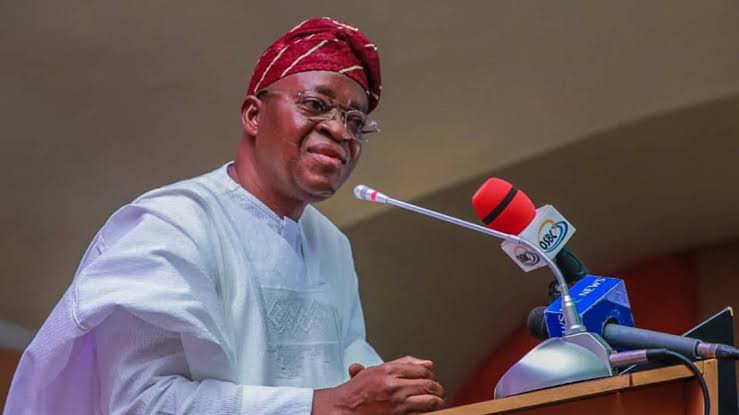The Federal Ministry of Marine and Blue Economy has vehemently refuted allegations circulating in the media regarding a purported multibillion-naira contract awarded by Minister Adegboyega Oyetola for the Baro Inland Port project. The ministry, through a statement issued by Dr. Bolaji Akinola, Special Adviser on Media and Communications to the Minister, categorically denied the existence of such a contract under the current administration, labeling the reports as false and misleading. The statement emphasized that the Baro Port project predates Minister Oyetola’s tenure and that any claims linking him to a new multibillion-naira contract are entirely fabricated and based on misinformation. The ministry clarified that the project was conceived, planned, and initiated under previous administrations, with the official commissioning taking place in 2019 during the presidency of Muhammadu Buhari.
The ministry’s statement underscored that while the Baro Inland Port, situated in Niger State, holds significant national importance, the current administration has not awarded any new contracts related to the project. The present focus, according to Dr. Akinola, is on thoroughly assessing the existing infrastructure and formulating a comprehensive roadmap for sustainable development, rather than duplicating past efforts. This approach reflects the ministry’s commitment to responsible resource allocation and a strategic vision for the future of the port. The ministry’s denial aims to correct the misinformation and ensure that public perception aligns with the factual reality of the situation surrounding the Baro Port project.
The ministry further clarified the nature of Minister Oyetola’s involvement with the National Assembly regarding the Baro Port. Contrary to reports suggesting a summons or investigation, Dr. Akinola explained that the Minister was formally invited to participate in a stakeholders’ engagement session organized by the Ad-hoc Committee on National Stakeholders Engagement on the Challenges and Prospects of the Baro Inland Port. This session served as a platform for dialogue and collaborative evaluation of the current status and future potential of the Baro Port initiative. The ministry’s active participation in this engagement, according to Dr. Akinola, underscores its commitment to transparency, accountability, and intergovernmental cooperation in advancing national development goals.
The stakeholders’ engagement session, far from being an investigative hearing, provided a valuable opportunity for open communication and collaborative assessment of the Baro Inland Port project. Representatives from various stakeholder groups, including government agencies, private sector entities, and community representatives, convened to discuss the challenges hindering the port’s operationalization and explore strategies for maximizing its potential. The ministry’s participation in this forum allowed for a productive exchange of ideas and perspectives, contributing to a more comprehensive understanding of the issues at hand and facilitating the development of informed solutions. This collaborative approach reflects the ministry’s commitment to engaging stakeholders in the decision-making process and fostering a shared vision for the future of the Baro Port.
The ministry emphasized Minister Oyetola’s unwavering dedication to fostering sustainable growth within Nigeria’s maritime and inland waterway sectors, prioritizing responsible financial management and ensuring accountability for every naira spent. This commitment aligns with the broader national development objectives of optimizing infrastructure investments and maximizing their impact on economic growth and social progress. The ministry’s proactive approach to engaging with stakeholders, addressing misinformation, and promoting transparency demonstrates its commitment to responsible governance and its dedication to ensuring the efficient and effective utilization of public resources.
The ministry’s statement concluded with an appeal to the public and the media to exercise due diligence in verifying information through appropriate channels before disseminating it. This call for responsible reporting aims to prevent the spread of unfounded narratives that could undermine the collaborative efforts underway to advance national infrastructure development. By emphasizing the importance of accurate and verified information, the ministry seeks to foster a conducive environment for constructive dialogue and collaborative action toward achieving shared national development goals. This approach underscores the ministry’s commitment to transparency, accountability, and its collaborative partnership with the media in ensuring the accurate portrayal of its activities and initiatives.


